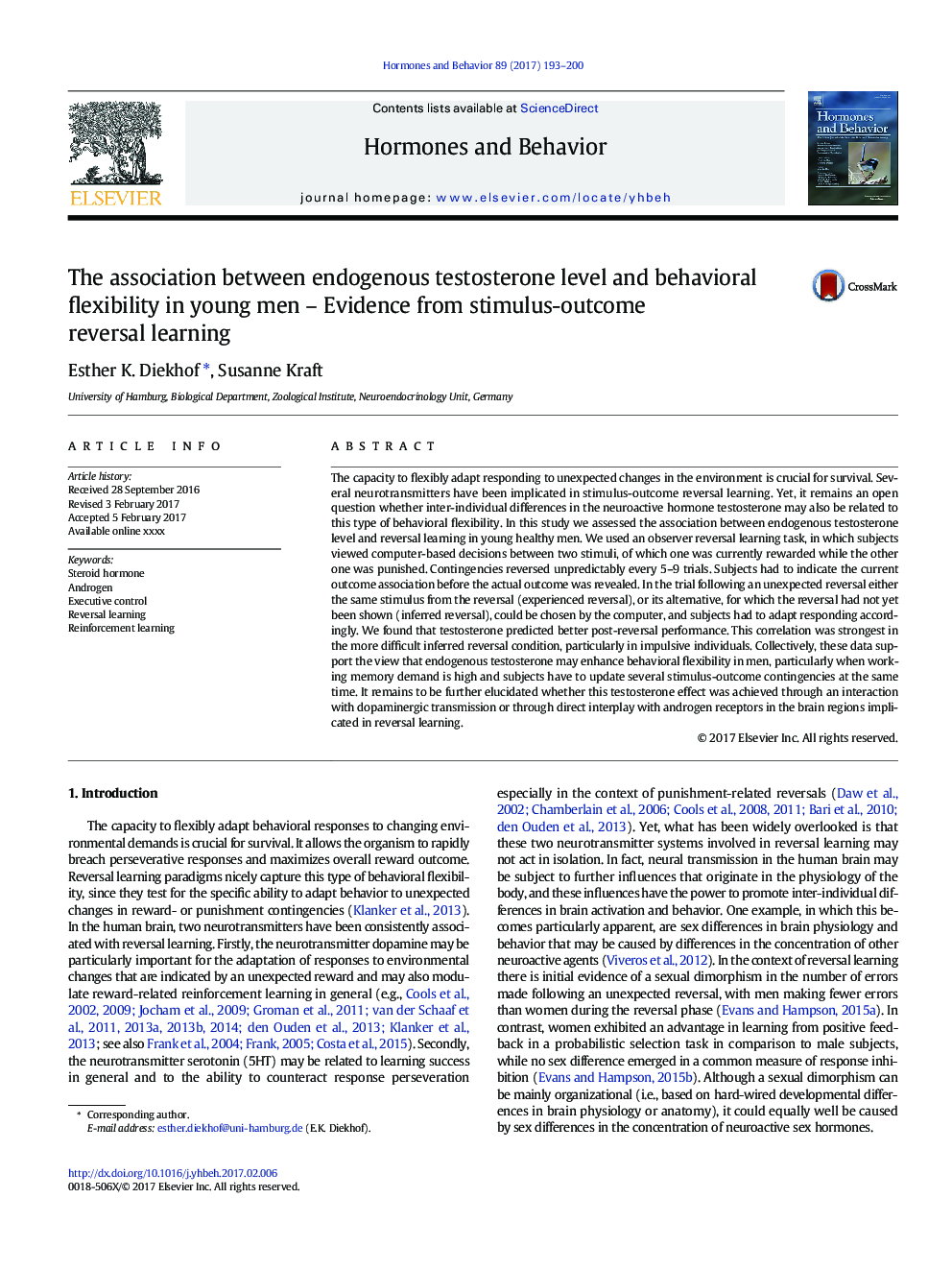| کد مقاله | کد نشریه | سال انتشار | مقاله انگلیسی | نسخه تمام متن |
|---|---|---|---|---|
| 4931189 | 1432751 | 2017 | 8 صفحه PDF | دانلود رایگان |
عنوان انگلیسی مقاله ISI
The association between endogenous testosterone level and behavioral flexibility in young men - Evidence from stimulus-outcome reversal learning
ترجمه فارسی عنوان
ارتباط بین سطح تستوسترون درونی و انعطاف پذیری رفتاری در مردان جوان - شواهد حاصل از یادگیری معکوس و نتیجه معکوس
دانلود مقاله + سفارش ترجمه
دانلود مقاله ISI انگلیسی
رایگان برای ایرانیان
کلمات کلیدی
هورمون استروئیدی، آندروژن، کنترل اجرایی، یادگیری معکوس، تقویت یادگیری،
ترجمه چکیده
ظرفیت انعطاف پذیری انطباق دادن پاسخ به تغییرات غیرمنتظره در محیط برای زنده ماندن حیاتی است. چندین انتقال دهنده عصبی در یادگیری معکوس-نتیجه پیگیری شده اند. با این وجود، این موضوع همچنان یک سوال باز است که آیا اختلاف بین فردی در تستوسترون هورمون عصبی نیز ممکن است به این نوع انعطاف پذیری رفتاری مرتبط باشد. در این مطالعه، ارتباط بین سطح تستوسترون درونی و یادگیری معکوس در مردان سالم جوان را مورد بررسی قرار دادیم. ما از یک کار یادگیری معکوس ناظر استفاده کردیم که در آن افراد تصمیمات مبتنی بر کامپیوتر را بین دو محرک مشاهده کردند، که در حال حاضر پاداش داده شده است، در حالی که دیگر مجازات شده است. احتمالات در هر 5 تا 9 آزمایش غیر قابل پیش بینی است. افراد باید قبل از رسیدن نتیجه واقعی نشاندهنده ارتباط نتایج کنونی باشند. در محاکمه ای که پس از یک چرخش غیرمنتظره یا محرک مشابه از معکوس (معکوس تجربه شده) و یا جایگزین آن، که بازنگری هنوز نشان داده نشده بود (معکوس تعقیب)، می تواند توسط کامپیوتر انتخاب شود، و افراد باید پاسخ دهند بر این اساس. ما دریافتیم که تستوسترون پیش بینی عملکرد بهتر پس از انقباض را دارد. این همبستگی در شرایط سخت تر پیشبینی شده، به ویژه در افراد مهاجم، قوی تر بود. به طور خلاصه، این داده ها از دیدگاه تستوسترون اندوژن می تواند انعطاف پذیری رفتاری در مردان را افزایش دهد، به ویژه هنگامی که تقاضای حافظه زیاد است و افراد باید همزمان با چندین احتمال احتمالی محرک به روز شوند. هنوز معلوم شده است که آیا این اثر تستوسترون از طریق تعامل با انتقال دوپامینرژیک و یا از طریق ارتباط مستقیم با گیرنده های آندروژنی در ناحیه مغز منجر به یادگیری معکوس به دست آمد.
موضوعات مرتبط
علوم زیستی و بیوفناوری
بیوشیمی، ژنتیک و زیست شناسی مولکولی
علوم غدد
چکیده انگلیسی
The capacity to flexibly adapt responding to unexpected changes in the environment is crucial for survival. Several neurotransmitters have been implicated in stimulus-outcome reversal learning. Yet, it remains an open question whether inter-individual differences in the neuroactive hormone testosterone may also be related to this type of behavioral flexibility. In this study we assessed the association between endogenous testosterone level and reversal learning in young healthy men. We used an observer reversal learning task, in which subjects viewed computer-based decisions between two stimuli, of which one was currently rewarded while the other one was punished. Contingencies reversed unpredictably every 5-9 trials. Subjects had to indicate the current outcome association before the actual outcome was revealed. In the trial following an unexpected reversal either the same stimulus from the reversal (experienced reversal), or its alternative, for which the reversal had not yet been shown (inferred reversal), could be chosen by the computer, and subjects had to adapt responding accordingly. We found that testosterone predicted better post-reversal performance. This correlation was strongest in the more difficult inferred reversal condition, particularly in impulsive individuals. Collectively, these data support the view that endogenous testosterone may enhance behavioral flexibility in men, particularly when working memory demand is high and subjects have to update several stimulus-outcome contingencies at the same time. It remains to be further elucidated whether this testosterone effect was achieved through an interaction with dopaminergic transmission or through direct interplay with androgen receptors in the brain regions implicated in reversal learning.
ناشر
Database: Elsevier - ScienceDirect (ساینس دایرکت)
Journal: Hormones and Behavior - Volume 89, March 2017, Pages 193-200
Journal: Hormones and Behavior - Volume 89, March 2017, Pages 193-200
نویسندگان
Esther K. Diekhof, Susanne Kraft,
